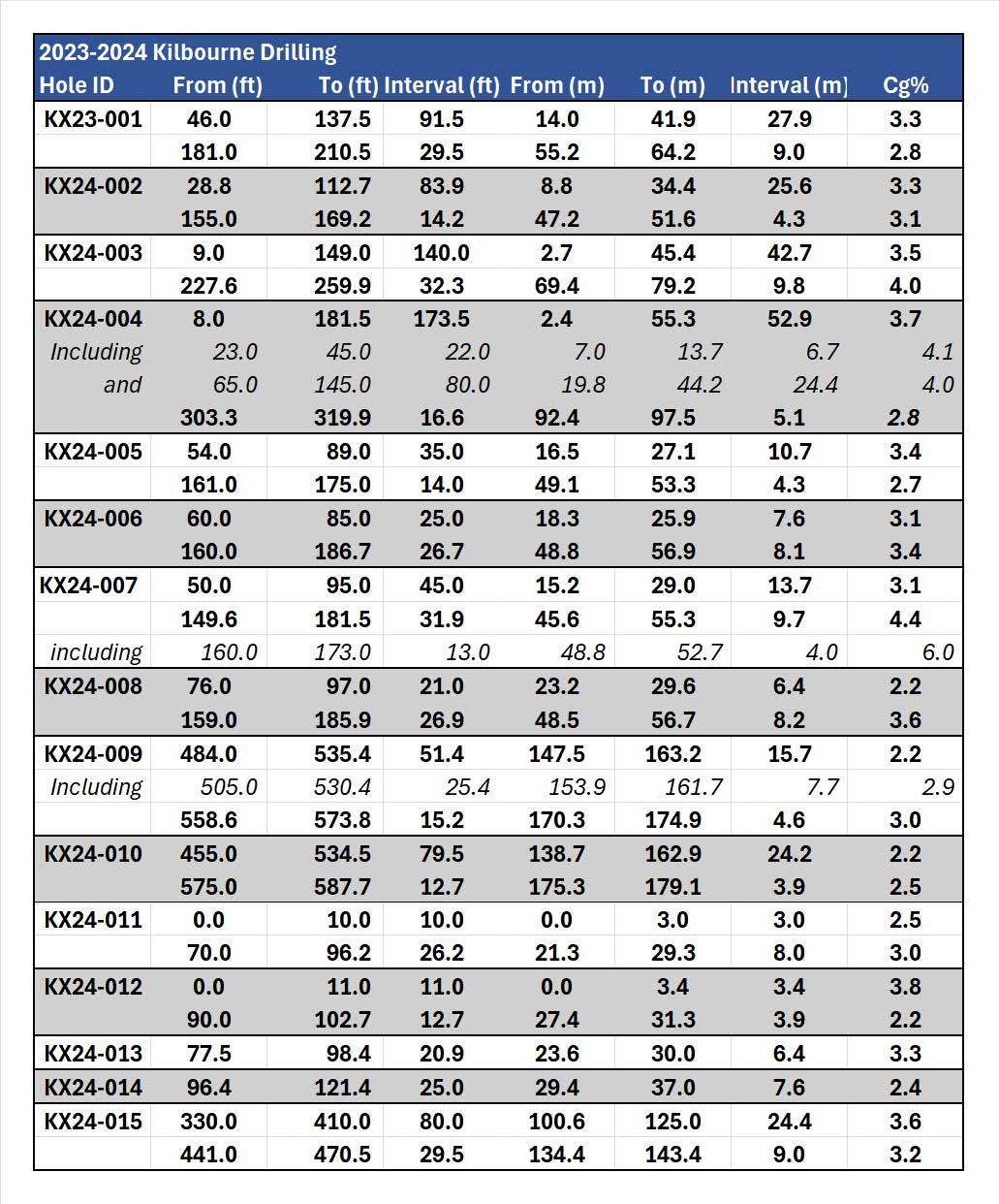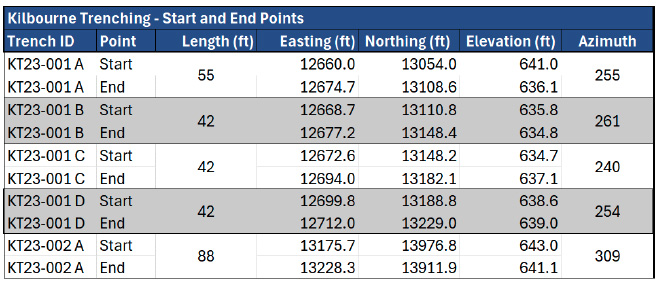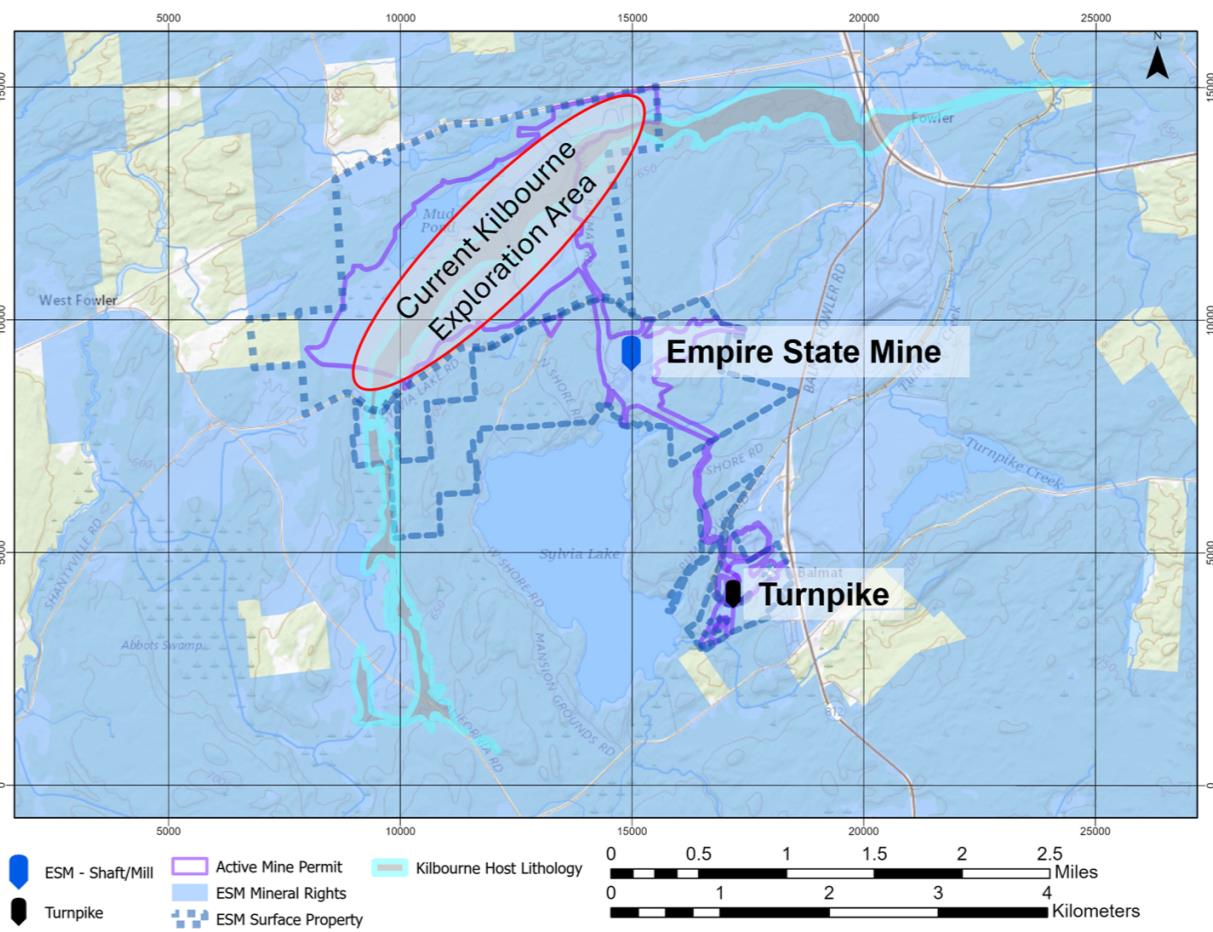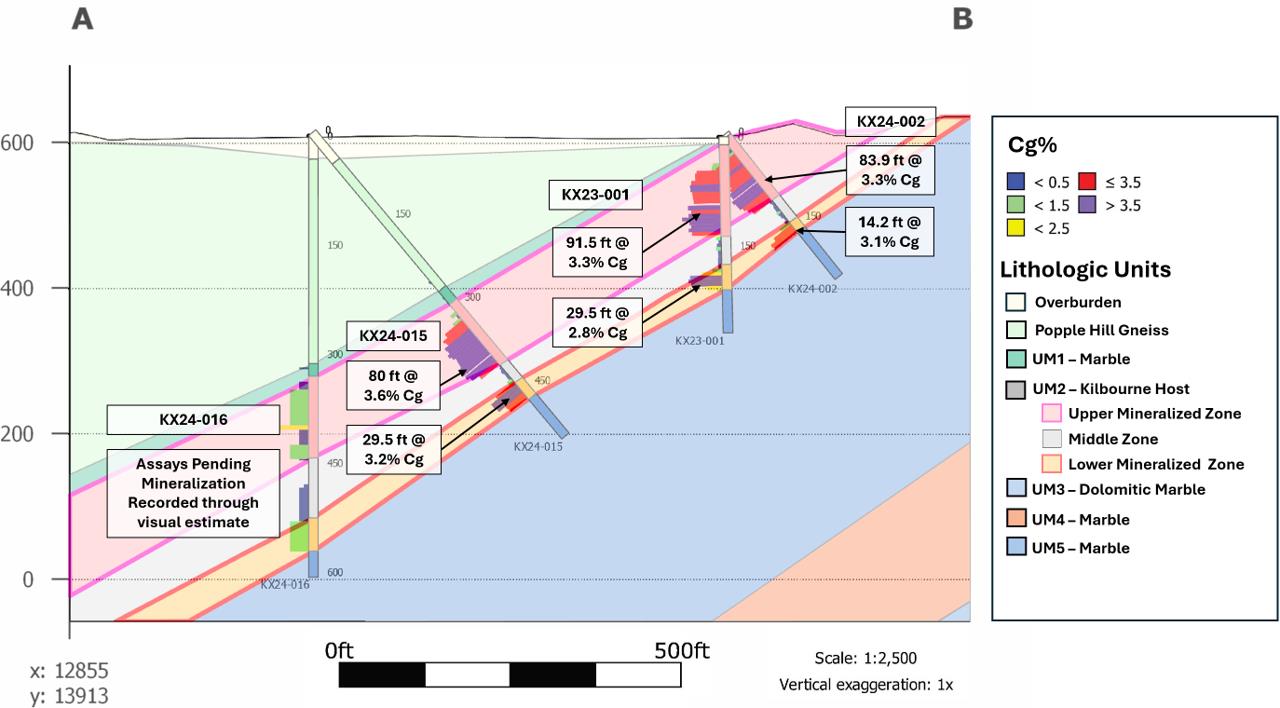Titan Mining Provides Initial Drill Results on the Kilbourne Graphite Project, Results Include 173.5 ft at 3.75% Graphitic Carbon
Vancouver, B.C., April 9, 2024 – Titan Mining Corporation (TSX:TI) (“Titan” or the “Company”) is pleased to provide an update on the ongoing Kilbourne exploration program. The Company has received assays from the initial phase of trenching and from the initial fifteen drill holes of the Company’s ongoing graphite exploration program. The first phase of exploration has been focused on mineralization within the fully permitted footprint of the Company’s 100% owned Empire State Mine (“ESM”) in upstate New York.
Titan CEO Don Taylor commented, “We are very pleased with the results of the initial programs. The results have provided definitive evidence that the potential size and grade of the deposit are significant and present Titan with an early entry opportunity into the US graphite market. The Kilbourne target being tested is amenable to open pit mining on permitted ground.”
Surface drilling at Kilbourne has focused on delineating the thickness and grade of the historically documented graphite mineralization within the Company’s active mine permit. To date 21 core holes have been completed, totaling 7,357 ft (2,242 m) of drilling. The Company has received assays from 15 of the completed 21 holes.
Significant mineralized intercepts from drilling include:
- KX24-004 - 173.5 feet assaying 3.8% graphitic carbon
- Including 80.0 feet assaying 4.0%graphitic carbon
- KX24-003 - 140.0 feet assaying 3.5% graphitic carbon
- KX23-001 - 91.5 feet assaying 3.3% graphitic carbon
- KX24-002 - 83.9 feet assaying 3.3% graphitic carbon
- KX24-015 - 80.0 feet assaying 3.6% graphitic carbon
The Company is pleased by the early success of the Phase I exploration program at Kilbourne. Graphite mineralization has been successfully tested from surface to vertical depths of 592 ft (180 m), and along a strike length of nearly 5,000 ft (1,524 m). All drilling has taken place within the Company’s active use permit. In Phase I an additional 11 holes are planned to test near surface mineralization within the remaining 3,500 ft (1,066.8 m) of target strike length.
In addition to the ongoing drill program, the Company completed 265 feet (80.7 m) of channel sampling, testing bedrock exposed through trenching. To date, 91 trench samples have been collected.
The assay results have continued to exceed expectations, with the grade of mineralized drill intercepts averaging 3.2% Cg (graphitic carbon). Individual samples within the mineralized zones have returned assays ranging up to 11.3 % Cg (KX24-007 from 165.0 ft to 168.2 ft, part of the noted 13 ft interval from 160.0 ft to 173.0 ft at 6.0% Cg).
As part of Phase I, representative drill core intervals of both the upper and lower mineralized zones have been selected for composite and metallurgical testing. Forte Analytics (formerly RDI) of Wheat Ridge, Colorado has been contracted to perform tests to evaluate processing options in order to maximize recovery and concentrate grades while maintaining the natural large flake size of the Kilbourne mineralization. Preliminary testing at SGS Labs in Lakefield, Ontario has shown that the Kilbourne Mineralization is able to be purified to a satisfactory quality, and that early size fraction analyses places the material in a suitable range for battery usage, and other applications.
Table I. Mineralized intercepts from underground exploration program

Note: The true width of the mineralization is not currently known.
Table II. Collar Location

Table III. Results from the Kilbourne Trenching Program

Table IV. Trench Segment Start and End Points

All trench samples collected from within 6 inches (15.2 cm) of the bedrock surface.
Figure 1. Location of the Kilbourne Project relative to ESM Operations, solid hollow shape represents the active mine area currently permitted.

Figure 2. Plan view of drilling showing the location of Kilbourne Exploration holes, planned drill holes, and trenching.

Figure 3. Cross section showing host lithologies with assays from 2023-2024 drilling. Highlighted are holes KX23-001, KX24-002, and KX24-015.

Looking North East, section line marked on Figure 2.
Qualified Person
The scientific and technical information contained in this news release and the sampling, analytical and test data underlying the scientific and technical information has been reviewed, verified and approved by Donald R. Taylor, MSc., PG, President and Chief Executive Officer of the Company, a qualified person for the purposes of NI 43-101. Mr. Taylor has more than 25 years of mineral exploration and mining experience and is a Registered Professional Geologist through the SME (registered member #4029597). Mr. Taylor verified the data disclosed, including sampling, analytical, and test data underlying the information included in this news release for which he is responsible, by performing a number of checks to confirm the accuracy of such data. In addition, Mr. Taylor reviewed the QA/QC reports from the Company’s drill programs and noted that there were no issues that arose which would affect confidence with the assay data.
Assays and Quality Assurance/Quality Control
To ensure reliable sample results, the Company has a rigorous QA/QC program in place that monitors the chain-of-custody of samples and includes the insertion of blanks and certified reference standards at statistically derived intervals within each batch of samples. Core is photographed and split in half with one-half retained in a secured facility for verification purposes. Drill core samples submitted for analysis had a minimum weight of 0.6 lb (0.3 kg) and a maximum weight of 6.0 lb (2.7 kg), with an average weight of 3.6 lb (1.6 kg). Trench samples submitted for analysis had a minimum weight of 4.2 lb (1.9 kg) and a maximum weight of 26.2 lb (11.9 kg), with an average weight of 6.2 lb (13.6 kg).
Analysis has been performed at SGS Canada Inc. (“SGS”) an independent ISO/IEC accredited lab. Sample preparation (crushing and pulverizing) and total graphitic carbon analysis has been completed at SGS Lakefield, Ontario, Canada. SGS prepares a pulp of all samples and sends the pulps to their analytical laboratory in Burnaby, B.C., Canada for multielement analysis. SGS analyzes the pulp sample by leach and IR combustion for total graphitic carbon (GC_CSA05V) and aqua regia digestion (GE-ICP21B20 for 34 elements) with an ICP – OES finish including Cu (copper), Pb (lead), and Zn (zinc). All samples in which Cu (copper), Pb (lead), or Zn (zinc) are greater than 10,000 ppm are re-run using aqua regia digestion (GO_ICP21B100) with the elements reported in percentage (%).
The Company has not identified any drilling, sampling, recovery, or other factors that could materially affect the accuracy or reliability of the data set out in this news release. True widths of the mineralized zones described in this news release are not presently known.
About Titan Mining Corporation
Titan is an Augusta Group company which produces zinc concentrate at its 100%-owned Empire State Mine located in New York state. Titan is built for growth, focused on value and committed to excellence. For more information on the Company, please visit our website at www.titanminingcorp.com.
Contact
For further information, please contact:
Investor Relations: Email: info@titanminingcorp.com
Cautionary Note Regarding Forward-Looking Information
Certain statements and information contained in this new release constitute "forward-looking statements", and "forward-looking information" within the meaning of applicable securities laws (collectively, "forward-looking statements"). These statements appear in a number of places in this news release and include statements regarding our intent, or the beliefs or current expectations of our officers and directors, including future exploration plans at the Kilbourne target and plans for future testing to evaluate processing options. When used in this news release words such as “to be”, "will", "planned", "expected", "potential", and similar expressions are intended to identify these forward-looking statements. Although the Company believes that the expectations reflected in such forward-looking statements and/or information are reasonable, undue reliance should not be placed on forward-looking statements since the Company can give no assurance that such expectations will prove to be correct. These statements involve known and unknown risks, uncertainties and other factors that may cause actual results or events to vary materially from those anticipated in such forward-looking statements, including the risks, uncertainties and other factors identified in the Company's periodic filings with Canadian securities regulators. Such forward-looking statements are based on various assumptions, including assumptions made with regard to the ability to advance exploration efforts at ESM; the results of such exploration efforts;; the ability to secure adequate financing (as needed); the Company maintaining its current strategy and objectives; and the Company’s ability to achieve its growth objectives. While the Company considers these assumptions to be reasonable, based on information currently available, they may prove to be incorrect. Except as required by applicable law, we assume no obligation to update or to publicly announce the results of any change to any forward-looking statement contained herein to reflect actual results, future events or developments, changes in assumptions or changes in other factors affecting the forward-looking statements. If we update any one or more forward-looking statements, no inference should be drawn that we will make additional updates with respect to those or other forward-looking statements. Readers should not place undue importance on forward-looking statements and should not rely upon these statements as of any other date. All forward-looking statements contained in this news release are expressly qualified in their entirety by this cautionary statement.



